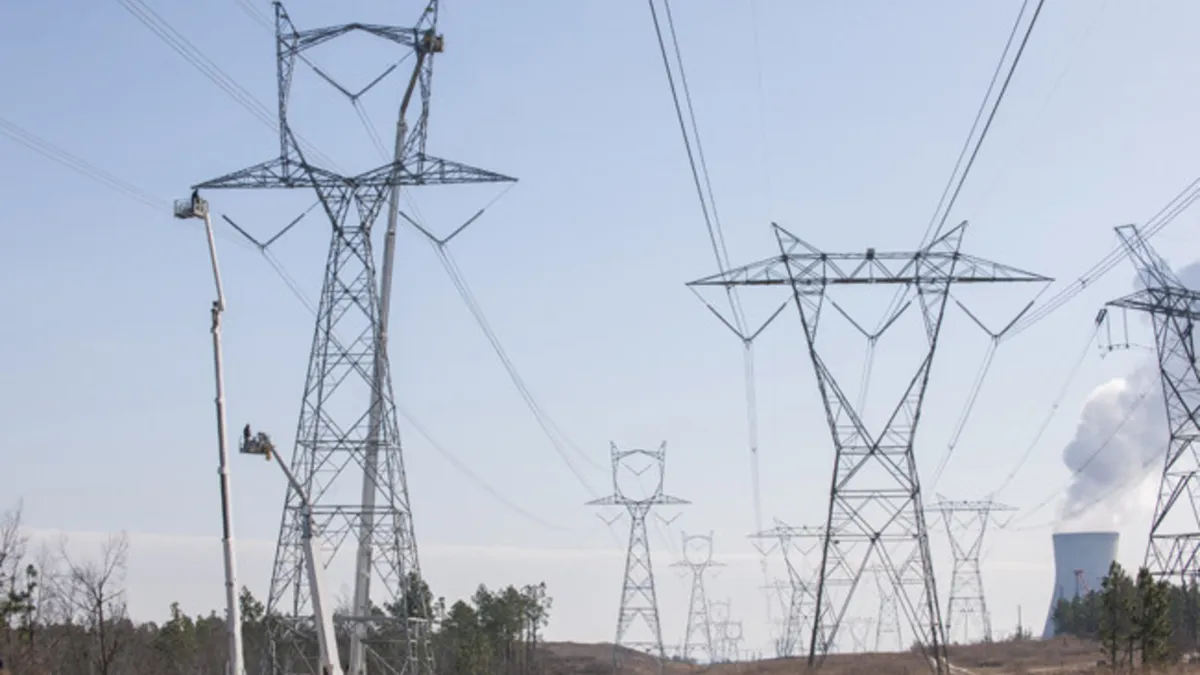A stalemate-breaking franchise proposal to end the 10-year, $27.6 million legal and regulatory fight by Boulder, Colorado, to replace Xcel Energy with a municipal electric utility goes to voters next month, one of more than 100 statewide ballot measures being put before voters across the country this election.
Municipalization advocates remain determinedly opposed to the investor-owned utility.
"Xcel is protecting its investments in fossil fuels and slow walking the transition to renewable generation," said Leslie Glustrom, spokesperson for local power advocacy group Empower Our Future. "There are no facts about the future, but there is good reason to believe Xcel doesn't intend to honor the proposed opt-outs and will continue blocking more competitive options," she said of agreement provisions allowing Boulder to renew its municipalization effort if the utiity fails to honor its commitments.
But long-time municipalization advocates, including Boulder Mayor Sam Weaver, said the proposed agreement may be a game changer if the Nov. 3 vote finalizes it.
Unlike earlier proposals, "this gives Boulder options to exit if Xcel fails to perform," Weaver said about the agreement developed in a months-long Xcel-Boulder collaboration. "It meets the city’s decarbonization goal, commits to working on democratizing energy decisions, and makes decentralization of generation a goal."
On Aug. 20, Weaver and six council members approved Measure 2C for the Nov. 3 ballot. It is backed by Xcel Energy Colorado President Alice Jackson, who helped design the agreement. Those who worked with Xcel said they saw potential for future collaboration, but also understand how a contentious history makes voters’ skeptical of Xcel's intentions.
The council did not endorse the proposal. With pro- and anti-settlement voices rising, the voters’ decision may turn on who they trust.
From municipalization to settlement
Led by scientists at national climate research and renewable energy agencies based in Boulder, its electorate has long been active on municipalization, according to former Colorado Public Utilities Commission (CPUC) Chair Ron Lehr. Lehr acted as unofficial advisor to municipalization advocates before joining the commission in 1984.
"The voters can decide between a good agreement or pushing on with municipalization."

Sam Weaver
Mayor of Boulder
In 2010, voters approved Issue 2B by 68.4% to 31.6%. It created a roughly $4 million per year tax to support the municipalization effort.
In 2011, voters approved a $1.9 million tax increase for the municipalization effort, but by a narrow margin, and the fight with Xcel continued. In 2017, voters again extended funding for muncipalization-related work by a narrow margin.
In April 2020, with the tax terminating in 2022 and the COVID-driven economic downturn severely compromising Boulder's budget, Weaver, Council Member Yates, and city staff began working with Jackson and Xcel representatives on the agreement proposed in Measure 2C.
The offer
Xcel and Boulder set six goals that reflect municipalization objectives and "would build an energy future that is clean, local, reliable, secure and provides value back to the community," an Aug. 19 city statement said.
It is "about 70% of what a municipal utility could be," Weaver said. "The voters can decide between a good agreement or pushing on with municipalization."
Its first goal is decarbonizing. Xcel’s state mandate is to reduce emissions 80% below 2005 levels by 2030. The proposed franchise commits Xcel to working toward Boulder’s 100% renewables by 2030 goal.
Critically, municipalization is not terminated by the agreement, and Xcel commits to removing legal and regulatory obstacles to it. Boulder can return to its municipalization efforts in 2023, 2025 or 2028 if Xcel fails to meet emissions reduction mileposts, and can exit the agreement "for any reason" in 2026, 2031, 2036 or at franchise termination in 2041.
"The 5-year opt outs are legally binding," said Boulder Council Member Bob Yates, who participated in the negotiations. The agreement states that Boulder "may, in its sole, absolute, and arbitrary discretion, without any condition, prerequisite, or qualification whatsoever, terminate this Franchise Agreement," he added.
The second agreement goal is decentralizing energy sourcing by increasing local generation and streamlining access to customer-sited resources. The third goal is democratizing utility planning by giving Boulder's citizens a voice and improving engagement with Boulder leaders and customers.
Xcel also commits to "competitive rates" that balance "short-term and long-term interests," and to "a stable, safe and reliable energy supply," according to the city website.
Partnership?
The proposal’s Energy Partnership Agreement is another key feature, said the director of Boulder's Climate Initiatives Department, Steve Catanach, who worked on the deal. "It establishes governance and a process that will define the projects and programs we will work on together to fill the gap between Xcel’s 80% emissions reduction and the city's 100% renewables goal."
The partnership’s vision is "rapidly transitioning to a clean energy economy" with "innovative strategies," the city reported. Subject to CPUC approval, it commits Xcel to working toward 100% renewables and 50% local energy, and to data sharing, new microgrids, distribution line undergrounding, and transportation and building electrification.
Municipalization advocates do not trust the proposal. They say Xcel will use financial and accounting devices to avoid meeting its emissions reduction commitments and will use legal entanglements to keep the city from exiting the new franchise and municipalizing.
"Xcel contends it will get Boulder to its goals faster and cheaper. If Boulder takes this agreement, Xcel will have five years to prove it."

Chris Hansen
State Senator, Colorado
"If Xcel really wanted to partner with us in addressing the climate crisis, it has had more than enough time to demonstrate it," Glustrom said. But Xcel’s culture "puts shareholders, profits and defending Xcel’s monopoly status as first priorities."
But the new agreement has built-in protections and can be an opportunity, city leaders said.
The settlement includes a partnership governance structure with an executive team made up of Xcel Colorado's president, other Xcel executives, and Boulder city managers and elected leaders. It also specifies accountability for program and project execution, with oversight by community, business and academic advisors.
"I have been a municipalization supporter and Xcel made it clear we would not have ended up with these commitments if it were not for the threat of municipalization," Weaver said. "But things have changed."
Xcel’s Jackson initiated the talks and committed to the partnership because it has benefits for the utility, "but it [also] has real potential for collaboration, and if it works, there won't be much appetite to exit," Weaver added. "If it is falling apart, we know who to talk to, and if we find out it is just for show, there will likely be renewed appetite to exit."
But if the threat of municipalization is eliminated, Xcel’s commitment to Boulder’s goals will "evaporate" and Xcel may not make opting out "easy, cheap or convenient," former Boulder Mayor Suzanne Jones warned.
Municipalization has advantages, "but there are significant costs and downsides, too, which is what Boulder came up against," said Chris Hansen, the state senator behind Colorado’s 80% emissions reduction mandate. "Xcel contends it will get Boulder to its goals faster and cheaper. If Boulder takes this agreement, Xcel will have five years to prove it."
Competing uncertainties
Municipalization advocates say Xcel’s past performance demonstrates it will not meet its commitments to Boulder and a municipal utility will meet the city’s goals sooner and at a lower cost.
Xcel’s 80% emissions reduction by 2030 target will likely be achieved from a 70% system renewables penetration while recent city solicitations show a municipal utility can be at 90% renewables "on day one," Empower’s Glustrom said. And Xcel could block Boulder's efforts to use the opt outs "in endless litigation, as it has done with the municipalization effort."
The biggest challenge to municipalization, observers said, could be cost.
The long-debated price for taking over Xcel’s assets will be capped at $200 million by the settlement, which eases the cost burden. But stranded costs for generation acquired by Xcel to serve Boulder are a key uncertainty not addressed by the agreement. Such costs will be determined through a federal regulatory proceeding. Xcel has estimated them at over $300 million, though the city may be able to reduce them.
Boulder can use revenues from Xcel-level rates to meet the cost challenge, Glustrom said. In addition, a community choice energy provider, if enabled by legislation, or an outside investor, could use the low cost of renewables and today’s low interest rates "to provide 90% renewable electricity at a savings of about $40 million a year" and "to finance the completion of the legal and regulatory process" for municipalization.
"I believe Alice Jackson sincerely wants to move Xcel into the 21st century, but her job is to balance the bottom line for the shareholders and move the company forward."

Leslie Glustrom
spokesperson, Empower Our Future
But after a stalemated 10-year, $27+ million struggle, these unproven numbers and municipalization advocates’ promises about local decision-making met doubts from council members and the public during the Aug. 20 council meeting debate.
That debate offered few certainties. Both sides claimed they can provide the best reliability, the fastest, lowest-cost distribution system line undergrounding, and the most customer satisfaction. But the uncertainty most often raised was about Xcel’s future performance.
Xcel has not met Boulder’s decentralization and democratization goals and its pace of decarbonization "is not very significant," Glustrom said. "We have a climate crisis and they should not be slow walking this transition."
Xcel’s coal retirements make it "dependent on renewables to make peak load, which is proof we are accelerating this transition," Xcel’s Jackson responded. Early retirement strategies for its Comanche 3 coal plant are being studied and the utility’s March 2021 Electric Resource Plan will include specific new approaches to further reduce emissions, she added.
Along with Yates and Weaver, long-time council member supporters of municipalization Mary Young and Aaron Brockett and tentative council member supporters Mark Wallach and Rachel Friend voted to send the proposal to voters. Newer council members Adam Swetlik and Junie Joseph opposed.
The council should not support "an agreement with a for-profit company whose first priority is shareholders," Swetlik emailed. "Money, energy and time have been lost because a corporation chose its own profits over the best interest of our ecosystem and the planet" by obstructing municipalization.
Colorado Gov. Jared Polis, D, the Colorado Energy Office, and the Colorado Department of Public Health and Environment have expressed support but have not endorsed the ballot measure. Former mayors and council members and Boulder environmental and business groups are campaigning for and against it.
"Trust is something you earn over time," Xcel’s Jackson told the Aug. 20 council meeting. "The first level of trust is simply that we came to the table and have worked very hard to find ways to help Boulder achieve its targets and goals."
People who have dealt directly with Jackson and Xcel Energy said there are reasons to believe her.
Who do you trust?
Jackson’s willingness to provide 5-year opt-outs shows the utility is committed to Boulder’s goals, Hansen said. Its next resource plan can "bring a large amount of new capital into [the] rate base and deliver on its promises."
"There is no evidence that Xcel has engaged in untrustworthy behavior and the settlement agreement has legally-binding commitments," Council Member and agreement broker Yates added.
Jackson and Xcel earned trust from Colorado’s solar industry by honoring the terms of a landmark 2016 settlement made with solar and environmental advocates that allowed the state's rooftop solar industry to continue growing.
"Xcel has changed in four years and is moving in the right direction," said Colorado Solar and Storage Association President and CEO Mike Kruger. Shareholder concerns do limit what it does, but Xcel is "working more collaboratively with stakeholders than in the past."
Xcel’s shareholder concerns are critical for municipalization advocates, Glustrom stressed. "I believe Alice Jackson sincerely wants to move Xcel into the 21st century, but her job is to balance the bottom line for the shareholders and move the company forward."
Xcel’s stock price has not changed in response to its commitments to decarbonization or to its commitments to Boulder, Jackson responded.
Municipalization has had important impacts, including "the leverage to get concessions from Xcel, but the vote will be close because some opponents joke that Boulder is in the 13th year of a three-year process," former CPUC Chair Lehr said.
"The key is ‘trust but verify.’ If Boulder leaders follow through over the long term on verification of Xcel’s performance, the agreement is worth trying," he said. "Xcel will do what is in its best interests, but the city has opt-out rights and they give it continued leverage. And even it litigation is needed, it could result in a better agreement or a new municipalization effort."
Correction: An earlier version of this story said Council Member Mirabai Nagle voted to send Measure 2C to voters. She didn't. It also inaccurately described the purpose of a $4 million annual tax approved by Boulder voters with Issue 2B in 2010. The story has been updated.























